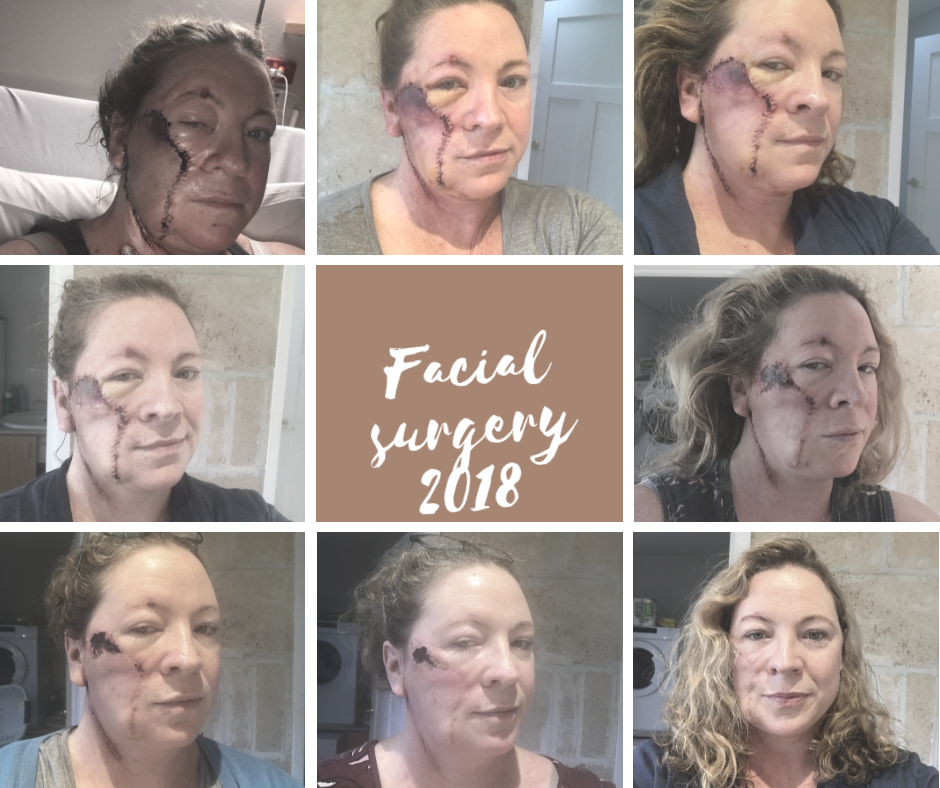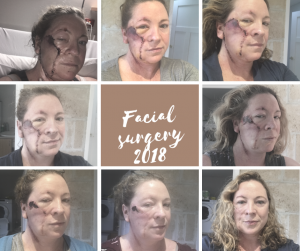What it’s really like to have skin cancer
Background
I’ve had a lot of time to reflect recently and I would like to share my story of skin cancer. While this recent surgery is the most intense, I’ve been having minor surgery for the removal of skin cancers since I was 25, including a scary melanoma in 2006 when I was 30. Most of my skin cancers have been basal cell carcinoma, the relatively benign, and most common kind. That might be considered nothing to worry about, and the fact of their ubiquity, especially here in sunny Western Australia, makes them so common as to be frequently disregarded. You can see the stats here https://www.cancerwa.asn.au/resources/2017-06-28-skin-cancer-statistics-fact-sheet.pdf
Treatments
After a few minor skin cancer procedures by GPs, I was around 27 when my right cheek had a small scabby spot that bled when I picked or knocked it. I went to have it removed by a surgeon under local anaesthetic, while my partner stayed in the car with our baby son. I had no idea how big the cut would be and was utterly shocked to see the huge incision on my cheek for such a tiny spot. That whole cheek is gone now…
I have had surgery to remove lesions from my ears, neck, tip of my nose, forehead, and right eyebrow. At last count there were 17 lesions removed from my face and 5 from my back. In between surgeries I’ve tried a natural salve (don’t do it!) and Efudix, a cream containing Fluorouracil, that causes blistering and peeling and may shrink the area required to be removed. It didn’t seem to work for me.
I see the dermatologist regularly for checkups. Despite knowing there were at least 7 more basal cell carcinomas to be removed from my face, I delayed treatment for over a year. I just couldn’t bear the interruption to my life, and the threat from the surgeon of cheek replacement. Eventually, as part of my PhD this year I undertook ACT (Acceptance and Commitment Therapy) training. It highlighted the things I was avoiding and inspired me to take action, so I did two years worth of tax and booked in to see the surgeon again.
Information
I’m a researcher so it’s no problem for me to source information. However while I read loads of journal articles about the surgery I was having, I struggled to find any clear information about the recovery process. The most helpful sources were facebook groups, including some that I had joined to learn about head and neck cancer (the topic of my PhD). As I became increasingly anxious in the lead up to surgery, I engaged with other people who had various cancers or facial differences and were living pretty well. They were incredibly empathetic, practical and supportive. I was really moved by the kindness of strangers and the power of online community.
Prognosis
These tiny red lesions that appear every year or so are almost all basal cell carcinomas (there was one squamous cell on my forehead, and that pesky melanoma on my back), so they are slow growing, unlikely to invade deeper tissues, and not life threatening. The odds are I will have more of them pop up as the years go by, however I don’t think I’ll ever get used to having surgery especially on my face. There’s also an increased risk of other cancers. According to Dr. Rodney Sinclair, director of dermatology at the Epworth Hospital and professor of medicine at the University of Melbourne in Australia, people who have non melanoma skin cancer before the age of 25 face a hugely increased risk of melanoma and other cancers. He says “By way of comparison, the risk is of the same order of magnitude seen for lung cancer after smoking a packet of cigarettes a day for 50 years.” I’m always working on living my best ‘anti-cancer’ lifestyle to counter those risks.
Emotions
Each time I’ve been diagnosed I’ve taken it with a fair bit of resignation. That could tip into depression but usually doesn’t, I try to move through the process with equanimity. However the repeated interruption to my life frustrates me, and makes it hard to plan for my business, study and even family holidays.
I’m the classic impatient patient. I am generally in control of my life, on top of things and keeping relative order amongst the chaos. Having to surrender to the process of waiting for appointments, waiting for results, and following doctor’s orders grates. I notice that clothes make a difference – I can take on the role of patient only when I have taken off my bra and donned the backless gown of humility.
Roles
I feared that this cervicofacial flap surgery would drastically alter the roles I play in my life. In recent years I’ve built a profile as a yoga teacher, workshop facilitator, public speaker and presenter. I use my face as a tool for communicating with individual clients and wider audiences. I imagined the worst kind of catastrophic loss of ability to be a storyteller, and re-imagined an alternative way to do my work through writing and audio only. Fortunately this hasn’t been as bad as my mental worst case scenario predictions. Just 2.5 weeks after the op, I co-facilitated a weekend of Yoga Nidra and Restorative teacher training for 30 wonderful participants, who accepted me as I was, and made it easy for me to step back into my role as teacher and guide.
Support
My immediate family and friends have been remarkable. Satyam has been by my side through the whole experience, making his special ‘skin healing meals’ rich in protein, beta-carotene, vitamin C, zinc and good oils. A riot of colour, each plate has ample orange and green veggies. He even brewed kombucha to help restore my microbiome after all the antibiotics. The boys had a super fun school holidays while I chilled on the couch, their friends and other parents helped ensure they had enough action and rest, with no demands on me. Friends who have busy lives and don’t live close by brought meals and company, and no matter what their circumstances, almost everyone in my circles reached out. A few were squeamish and didn’t want to see me or the pics, but most were just the right amount of curious and concerned for my well-being. Some practical supports were great, like yoga teachers covering my classes, and cleaning my studio and mats for the new term. I was blessed with free massage before the surgery, and an amazing session of ScarWork by a gifted bodyworking acquaintance just yesterday.
From the medical system there were diligent nurses in the hospital, followed by the wonderful Hospital in the Home nurses who visited every day for the first week, changing my dressings and reassuring me that everything was going well. When I was worried about the darkening bit of scab at the top of the flap, I sent a photo to my friend who is a nurse and she gave wise advice. She also came over to help with my systematic review – now that’s practical support!
I wouldn’t say that I received any psychosocial support in hospital or through the surgeon, but that may be a reflection of my choices. A pastor came by in the hospital offering support to my roommate but I had ticked ‘no religion’ so didn’t receive that service. They need a box for ‘it’s complicated’.
Self-care
I’m longing to get back to my yoga practice and exercise group, but am patiently adhering to the six week recommendation, as I want the best possible results. I did a pretty good ‘pre-hab’ approach leading up the operation, exercising 4 times a week and practicing yoga regularly. From day 2 I’ve tried to move as much as I can in safe ways, doing squats and lunges to keep leg strength, and using bolsters to support a gentle restorative yoga approach. After three and a half weeks of zero cardio, I’ve started walking again, and really felt the benefit of a 40 minute coastal hike on Sunday. Journaling, working a bit, sharing on social media, binge watching true crime docos, and staying in touch with friends have all helped, and the time has passed quickly.
Appearance
I’m 42, overweight and talk a lot about body acceptance and not being a judgemental douche. Yet my lopsided, still swollen face bothers me. People notice, and some pry. I don’t know which is worse – the asking or the ignoring, and mostly the interactions are okay (except the ones who touch – please don’t touch my face!). But it changes the purpose and focus of those interactions and makes me feel self-conscious. I don’t know yet if the disfigurement will be permanent, so far it’s healing really well and looking like it will be minimal so I look forward to the day when I can ‘pass’ again.
Physical Function
As yet I can’t turn my head fully to the left or laterally flex my neck (eg ear towards shoulder). This affects driving, and of course, impacts the range of movement available in my yoga practice. I had one painful hug and now know to only hug with my left side closest to the other person. It’s not easy to hug, kiss or be intimate, but hopefully that changes as the wounds heal. I don’t have a lot of need to lift heavy things, so that’s lucky.
Distress
At around day 5 when the bruising was worst (see pic collage and you’ll know the phase I mean) I felt very sorry for myself. I was bored, restless, uncomfortable, and would have scored about 7/10 for distress. Now that I have resumed most of my roles and can at least go for walks, it’s down to maybe 3/10.
Benefit Finding
I’m interested in post traumatic growth and have been observing myself for signs of wisdom! I think this may take a bit longer to really become my perspective, however I’ve certainly had time and space to reflect on my life, and am savouring the relationships that matter. The kindness I’ve experienced from community near and far has filled me with hope and appreciation. I feel like embracing life, and acting from my core values which I’ve identified (thanks to ACT) as authenticity, fitness and freedom.
My message to readers is firstly to take care of your skin. If you live in a culture where a tan is considered attractive, just fake it, the alternative is not worth the suffering. Secondly my experience is hopefully a reminder that we all have our traumas and challenges. The most blessed appearing life can hide deep sorrow, and the visible scars are just one part of what people go through. I hope my story inspires empathy, a willingness to hear and understand each other, and to seek beauty beyond the superficial.

